Israel’s brutal war is damaging the economy in the Gaza Strip

Israel’s brutal war is straining Gaza’s economy and leading to escalating food shortages and humanitarian problems
Amid the escalating conflict, the collapse of the Gaza Strip’s economy has led to severe food shortages and widespread poverty, leaving the population in urgent need of assistance.
In addition to the worsening humanitarian crisis in the Gaza Strip, the economic situation has also worsened since the beginning of the war.
Most people have lost their income and prices of basic goods have skyrocketed due to shortages.
Since October 7 last year, banks have stopped operating, ATMs have been destroyed and cash is beginning to disappear from the market.
The coastal enclave was under limited siege after the borders were completely closed following Israel’s takeover of the Rafah border as part of its military operation that began in early May.
Nearly half a million Palestinians in the north of the Gaza Strip do not have enough to eat. Many rely on flour or canned goods that they had stored before May 2024. Many have not eaten meat or vegetables for a month.
In the south, where humanitarian aid arrived before May, people still have some food supplies.
Amani Kumail, 40, who still lives in her house in northern Gaza, said she has had great difficulty cooking food for her four children in recent weeks due to a lack of basic ingredients.
“We still have flour and canned goods, but we don’t have gas or wood for cooking. We have to rely on canned goods, which is not a good choice for my children,” said Amani. The new Arab in a telephone interview.
Amani says that a kilo of tomatoes, if you can find them, can cost up to 100 NIS ($26). “How can we afford this when everyone has lost their jobs since the war began?”
The majority of Gaza’s population lost their jobs when the war broke out. Many business districts were destroyed and the remaining shops are now deserted as the dangerous situation makes it impossible for them to continue working.
To get cash, people must transfer money via mobile banking apps to others who have cash available, incurring fees of up to 20% of the amount withdrawn. While $100 is worth more than NIS 370 outside the Gaza Strip, it is exchanged for less than NIS 300 inside the Gaza Strip.
The humanitarian situation is very different in the north and south of the Gaza Strip. In the north of the Gaza Strip, no humanitarian aid was distributed for months, which led to the deaths of dozens of children from malnutrition and dehydration by March, according to the Gaza Ministry of Health.
There is currently a severe shortage of fruit and vegetables in northern Gaza due to the Israeli military presence in most agricultural areas. People in the south still have access to some products such as tomatoes and cucumbers, but at a price of over NIS 10 per kilo.
The World Food Programme (WFP) warned earlier last week that the ongoing conflict in Palestine was exacerbating acute hunger, leading to starvation and deaths amid widespread destruction and displacement in the Gaza Strip.
“By mid-July, over a million people, half of Gaza’s population, are expected to face extreme hunger and starvation,” the report said.
On Sunday, June 9, the director of the United Nations World Food Programme announced that the distribution of humanitarian aid from the American Pier had been “paused” due to “concerns for the safety of our population.”
This decision follows the June 8 incident in Nuseirat, in which hundreds of people were killed during an Israeli operation to free four Israeli prisoners.
Suha Arafat, who is currently living in a tent on the beach in central Gaza, said she relies on money her relatives send her from abroad to buy basic food items that are being sold at “insane prices.”
“Money transfer offices charge me up to 10% of incoming funds and sometimes I don’t get the money at all because there is not enough cash on the market,” she explained.
Suha says she has to buy everything for her family, including drinking water, because of the lack of humanitarian aid.
“I use sea water for cleaning and washing; it is the only source we have.”
Earlier this month, the Palestinian Health Ministry in Gaza reported that more than 37,400 Palestinians had been killed and more than 85,600 injured since October 7.
Patients who wanted to leave Gaza for medical treatment now face serious complications due to the border closure and the collapse of the health system.
Mustafa Muhammed, 36, who is currently seeking refuge in Nuseirat after fleeing Rafah last month, said the food situation in the south has worsened since early May.
Mustafa complained about the “greedy people” who demand extra money for everything, including cash withdrawals, and said the disappearance of the police officers had made the situation worse.
“I have lost my job since the war started, but I still have to buy quality food and formula for my baby, which are not available. We fear the worst is yet to come.”
Abeer Ayyoub is a freelance journalist based in Istanbul
Follow her on X: @abeerayyoub



